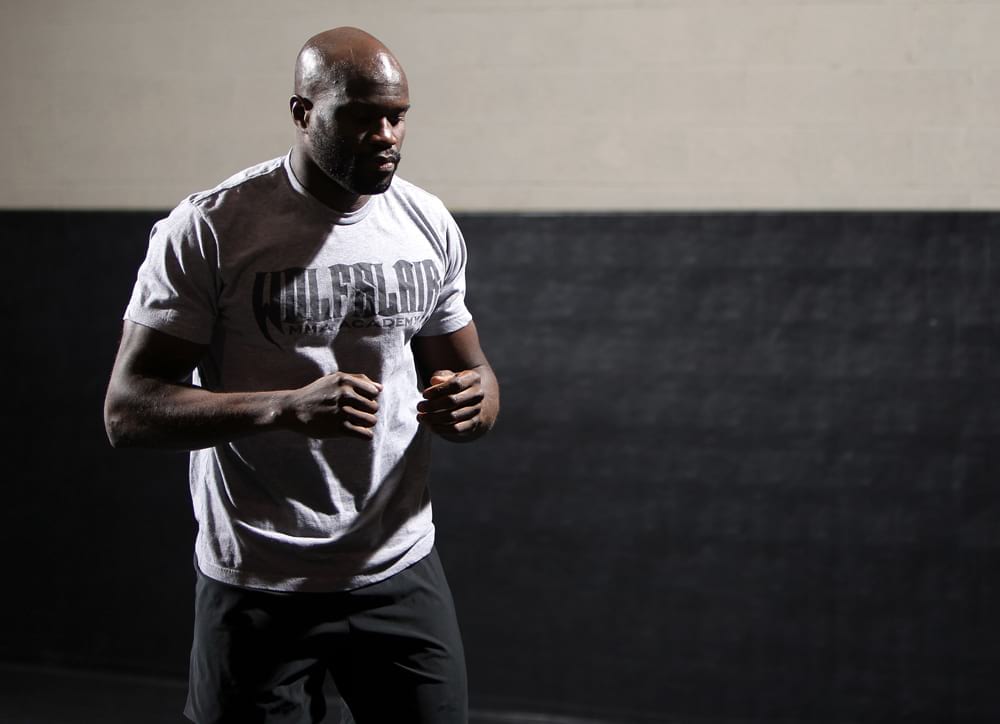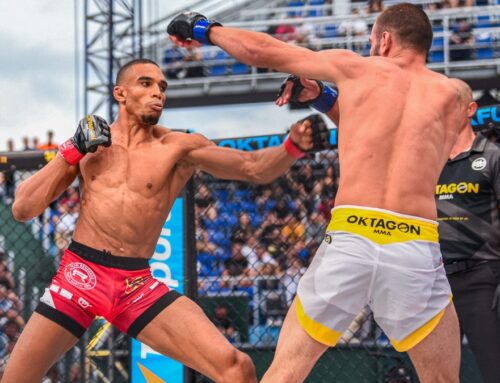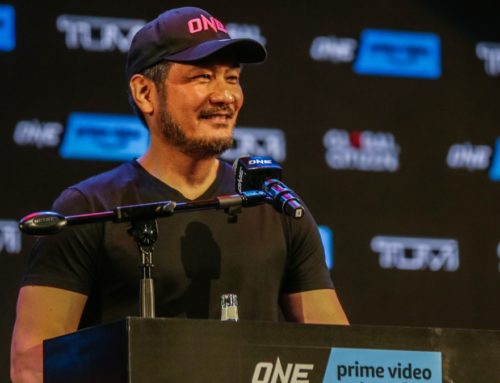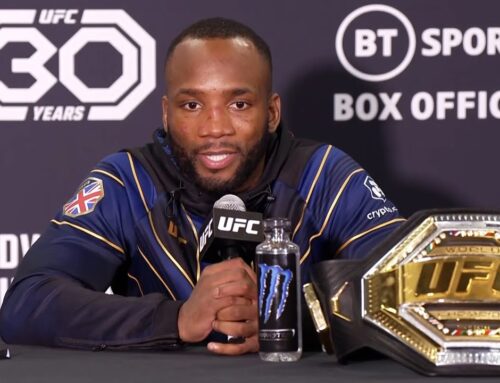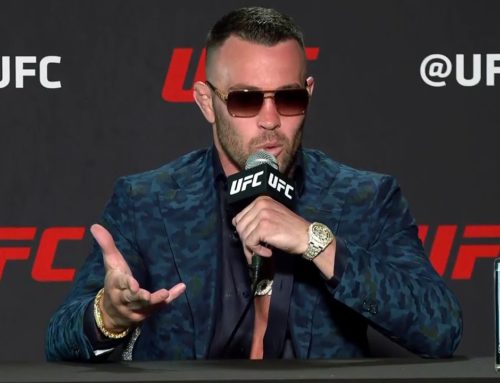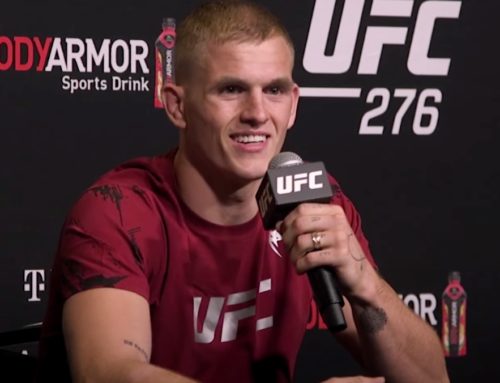Cheick Kongo turns forty-two years of age today (May 17) and is still built like a Greek God. He still packs the punch of one, too, a thunderbolt shocking enough to once upon a time drop Cain Velasquez on multiple occasions, and is still every bit as vulnerable as he is dangerous.
Interestingly, though, should he win his Bellator 179 fight this Friday (May 19) against undefeated Brazilian Augusto Sakai, Kongo will register a five-fight win-streak, the longest of his career, and stand as living proof that life really does begin at forty.
Count them up. Since losing to Muhammed Lawal via split-decision in February 2015, the towering Frenchman has defeated Alexander Volkov, now a promising UFC heavyweight, Vinicius Queiroz, Tony Johnson and Oli Thompson. Okay, admittedly, they all went the distance – Kongo is without an inside schedule win since 2014 – yet, even so, that’s some run of form at a time when most assumed he was effectively finished as a heavyweight contender.
It’s a surprise to see Kongo fighting at his ripe old age, much less winning back-to-back matches and now on the cusp of piecing together the best run of his career. Seven years ago, when 34, he told me, “I don’t want to grow old and still be fighting. As soon as I achieve my goals and have a chance to retire, I most definitely will. I have sacrificed a lot to get where I am and I don’t want to mess it up by hanging around too long. This is a dangerous sport and far too many fighters continue competing too long. I’ll keep fighting until my body tells me it is time to give up. If someone kicks my arse for real, I’d give up on the spot. It’s not happened yet, though.”
It still hasn’t happened, Cheick. There have been defeats – ten of them, in fact – but the image of him being folded inside a round by the likes of Mark Hunt and Roy Nelson in UFC fights seems a long time ago now. Replaced by images of Kongo frustrating heavyweights in Bellator, his latest home, the big man’s longevity is testament not only to his physical condition and clean-living but also his relaxed, care-free attitude to the sport.
“Fighting is a pleasure for me,” he explains. “I enjoy doing it and I’ve become good at it through years of hard work and dedication. It is also something I can do and make money from. It’s something I will do for many years, but it’s not the only thing I want to do with my life. I have many other goals and ambitions in my life and fighting isn’t the be-all and end-all for me. Fighting allows me to go out and make money without doing bad stuff. I know a lot of guys back in France who have to make money by being bad people. Thankfully, I don’t have to be one of them.
“Fighting comes naturally to me. It’s in our nature. Everybody fights for something in life, whether it’s the truth, a woman, a job or a world championship belt. We all have things we are passionate about. I’m passionate about competing and showing how good I can become as a fighter.”
With Kongo in London, England ahead of his next fight, I take the opportunity to remind him of the line he fed me seven years ago in Manchester; not wanting to spoil his birthday celebrations, I am moved nonetheless to get to the bottom of why, eighteen fights later, he’s gearing up for yet another assignment in a cage.
The bespectacled Kongo smiles.
“I’m the kind of guy that just loves to work, do my job,” he says. “I then leave it all in the locker room and move on to something else. I’ll keep going because I like it.
“I also became educated about athlete recovery. I used to be injured a lot of the time. Seven years ago, I would have been getting injured a lot and I might have seen a short future for me in MMA. But I fixed a few things, changed my lifestyle and I’ve been able to get more out of myself.
“I’m a lot more productive with my training now. For sure I don’t want to stay in this game that much longer. I’ll probably spend one more year or two at most. You never know what the game is going to bring to you. I don’t want to go for one fight too many. But I try my best.”
Kongo’s formative MMA years were spent in Holland, Croatia and then America. He scored five knockouts in his first seven wins and bagged a contract with the UFC in 2006, after which he secured the scalps of Mirko Cro Cop, Antoni Hardonk, Pat Barry, Matt Mitrione and Shawn Jordan. A perennial contender, Kongo fell some way short of a title shot – a win two-lose one form line ensured this – but, during the course of a seven-year UFC stint, became a fixture of major events, especially those outside the United States, and most of the time guaranteed drama and excitement.
Kongo, as they all do, initially had title aspirations. It would justify the journey and the hardship, he thought. But, in the end, setbacks and time cooled this ambition and saw him adopt an altogether more philosophical approach to the sport of MMA.
“I realised you don’t need a title to be called a ‘champion’,” he told me seven years ago. “Being a champion is more about how you conduct yourself as a man and a fighter. When you win a fight, you’re somebody. When you lose, you’re nobody. I’m happy to continue on this path and see where fate takes me.”
Now, following four wins in a row, Cheick Kongo is back to being a somebody. One more and he could even get a shot at finally becoming a champion.
“I feel the same,” he said today in London. “When I first came to this game it was like, ‘Okay, give me the opportunity to get the belt.’ I’d miss the first step and I wasn’t satisfied, for sure. I would get mad at myself. I would overtrain. I used to take a fight no matter what – injured or not injured. After that, I came to understand that you have to get your satisfaction elsewhere and you can’t just keep fighting even when you’re not fit. I took a step back and reshaped my thinking. Today it’s a really good motivation to be champ, but I still say that anyone can be a champion in life. A title belt is just another trophy on the wall.”

